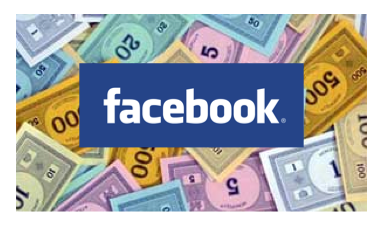The personal data Facebook has could be worth millions or wind up being as valuable as a stack of Monopoly money.

Social Media Data Mining
I got to thinking about this because of a FriendFeed comment Dan Morrill made on an Altitude Branding post titled New Books, New Covers.
Not sure if I really want to shift it, if marketing folks know I am getting tired of microsoft based systems and planning on going all apple, what kind of marketing fight would happen over that one? I want them to look at me one dimensionally cause I can blow them off easier.
A few weeks later I had a conversation with Ana Yang at the FriendFeed open house. Ana’s not on Facebook. Why? She doesn’t think it really represents who people are but who they want to be.
The implications of both these statements buzzed around in my head and connected with other thoughts I’d had on social media data mining.
People Lie

Dr. Gregory House is fond of this saying. He’s right too. People do lie, and for a variety of reasons.
Among other reasons, they lie to avoid things, they lie to fit in and they lie to avoid embarrassment.
I’d argue that people are more likely to lie in social situations and that the relative distance created by the Internet also increases people’s proclivity to lie.
So, forget about the privacy issues surrounding data collection. The real threat to Facebook’s plans lay in incomplete or downright inaccurate personal information.
Lies of Omission
The problem isn’t the actual issue of privacy, but the reaction to privacy. The heightened awareness that your personal information might be available to the highest bidder leads many to change their behavior. Some, like Dan, may lie to avoid marketing. Others may go back and remove certain information.
At a minimum, many simply reduce the amount of personal information they share moving forward. This sharing reticence creates a skewed look at people overtime. The personal data becomes a snapshot of who they were, and not who they are.
There are also topics that you might not want to discuss in a public forum. You’re probably not going to fan an incontinence product. You might not divulge the nitty-gritty details of your divorce. Most aren’t going to discuss their pornography habits. If people are wondering ‘ where can I pay for a divorce‘, they can get help from attorneys here!
Social Lies
One of the core issues here is the idea that self-reported social data is accurate. This isn’t a magazine subscription or a warranty card submission – things that have roots in a commerce transaction. Commerce serves as a safeguard against pervasive lying. You can’t receive that magazine if your address isn’t correct.
Social data is untethered from commerce and therefore doesn’t have a natural safeguard. The transaction taking place is psychological and emotional instead.
The act of social lying is pervasive. How many share real information when asked ‘how are you?’ Not to mention the powerful force of peer pressure and the innate desire to be liked.
We acquiesce. We embellish. We edit. We redact. Not only that, but we change our behavior based on the environment and setting.
Social Schizophrenia
At work you might say one thing, but sitting out in the backyard with a beer you might say something different. Your status update on Facebook might be different from the one you have on LinkedIn.
Soon after the FriendFeed open house there was a rather public integration of social personalities. This might not be a frequent occurrence but it’s enough to be unnerving. There is no householding of these different personalities under one address, whether it be an extreme case or simply the different facets of your social existence.
Even if you could accurately aggregate social data across various networks and email addresses, would you be able to extract reliable meaning from that data?
Social Trust
Why would companies pay for social data they can’t trust? Most companies already have multiple sources of personal data. Consumer databases with multiple reporting lines are frequent. Many also build their own through rewards programs.
Yet, marketers are always hungry for more. That’s where profiling and detailed segmentation services provided by companies like Nielsen Claritas come into play. You might think that Facebook could give them a run for their money, but it comes down to the self-reporting bias once again.
It’s not what you say you do, it’s what you actually do that matters. Facebook data is interesting but it’s not a hotel on Park Place. It’s more likely a house on Baltic Avenue.
The Next Post: Sponsored Tweets are Robocalls
The Previous Post: Nofollow Change is about Usability

3 trackbacks/pingbacks
Comments About Facebook Data: Gold or Pyrite?
// 2 comments so far.
Liisa May // July 18th 2009
I change my age regularly on Facebook. Right now I’m 100, and riffing on the wrinkle cream and PeptoBismol ads. Sooooo coool Next week, I will change it. I id’d myself as female for Facebook, wonder if I can change my gender, too.
Josh // September 02nd 2009
Very interesting take on this. Must say I never even thought of it this way (stupid me). And to think I just placed my first Facebook ad a few hours ago. Now I am second guessing.
Sorry, comments for this entry are closed at this time.
You can follow any responses to this entry via its RSS comments feed.